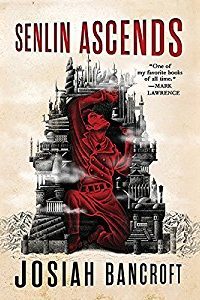Ian Mond Reviews Red Birds by Mohammed Hanif
 Red Birds, Mohammed Hanif (Bloomsbury 978-1408897188, £16.99, 304pp, hc) October 2018. (Grove/Black Cat 978-0802147288, $16.00, 304pp, tp) May 2019.
Red Birds, Mohammed Hanif (Bloomsbury 978-1408897188, £16.99, 304pp, hc) October 2018. (Grove/Black Cat 978-0802147288, $16.00, 304pp, tp) May 2019.
Mohammed Hanif draws on his own experience as an Air Force pilot for his fourth novel, Red Birds, a hit-and-miss satire on America’s attitude toward foreign policy, set in a refugee camp located in an unnamed Arabic country.
The narrative alternates between three characters, the first of which is a discombobulated Air Force pilot, Major Ellie, searching for the 65-million-dollar aircraft he crashed into the desert. Ellie had been tasked with taking out a refugee camp, the “hideout for some of the worst human scum,” but something went wrong in the air – Ellie isn’t entirely sure, his memory is patchy – and he now finds himself stumbling amongst the dunes, surviving on “four energy biscuits and two vitamin smoothies.” Meanwhile, over at the refugee camp, 15-year-old Momo – our second protagonist – a self-styled businessman and the proud owner of a vintage Jeep Cherokee 3600, is concerned about his older brother Ali, who hasn’t been seen since he was “contractually employed” (or sold by his father) to work at a nearby, and recently shut down, US Air Force hangar. Momo’s companion, sometimes irritant, and the novel’s third point of view, is Mutt, a mangy dog who has become an armchair philosopher following an incident with an electricity pole, “in which my brains got fried.” When a dehydrated and exhausted Ellie crosses paths with Momo and Mutt, the teenage entrepreneur sees it as an opportunity to raid the Hangar and bring his brother back home.
When Red Birds was first published in the UK last year, Hanif spoke about his time in the Pakistan Air Force, signing up at the age of 15 and discovering that he was really good at take-offs, and not so much the landings. Major Ellie is a better pilot (he knows all the jargon and enjoys his work), but it speaks to Hanif’s cheeky sense of humour that Red Birds opens with Ellie’s plane broken and burnt. This appreciation of the ridiculous informs the novel, and it comes to the fore when Hanif calls out the hypocrisy of the US military. A running gag is that Major Ellie, the man ordered to blow the crap out of a refugee camp, has also taken numerous courses and modules on subjects as varied as “Cultural Sensitivity,” “Basic Good Manners With Tribals,” “Sensitivity Toward Religious Rituals,” and my favourite, “How To Defend American Values Without Offending Their Own.” At the same time, Hanif’s satirical approach, while never ignoring or glossing over the terrible conditions on the refugee camp, cleverly frames it, from Momo’s perspective, as an endless list of get-rich-quick schemes that never eventuate. These failures articulate the teenager’s desperation to escape the misery of the camp.
I found, though, that once Ellie, Momo and Mutt’s lives intersect – about a third of the way through – the story begins to drag. It’s clear from the outset that Momo’s search for his brother will take him to the Hangar, but there’s a reluctance on his part to go there. Part of this is a justifiable fear of the unknown, of what Momo and his family might find in the deserted base (assuming it’s deserted at all). But this indecision on Momo’s part, coupled with Ellie’s weak attempts to disguise himself, to pretend he isn’t a US Air Force pilot, and Mutt’s long-winded, existential musings about life on the camp, while initially funny, become repetitive and tiresome.
Fortunately, things pick up in the last third of Red Birds. The arrival of the ghosts (I’ll say no more on that front), coupled with shorter chapters (some less than a page) and the inclusion of women’s voices (Momo’s mother steals the show) makes for a tense, thematically rich ending. What also emerges is a deep, raw pain that mostly stems from Mother Dear’s furious desire to reunite with her eldest son, but can also be found in the one chapter devoted to Cathy, Ellie’s wife. Cathy’s presence haunts the novel, figuratively and, as it transpires, literally. Ellie thinks about her regularly, and yet his initial yearning to return to Cathy abruptly transitions into something darker, more conflicted, all pointing to an abusive marriage (“I am way past missing Cath. I can barely remember Cath, her little taunts her whispers”). It’s when Cathy relates how she and Ellie met that Hanif shows his hand, presenting their broken relationship as a stark metaphor for America’s foreign policy:
I should have known. He liked his weapon more than his wife. It was always easier to bomb some far-off place than stay home and unload the dishwasher.
While the middle section of Red Birds could have done with more urgency and less contemplation, when the satire is on point it highlights the tragic legacy of America’s war against terror and the ghosts left in its wake.
Ian Mond loves to talk about books. For eight years he co-hosted a book podcast, The Writer and the Critic, with Kirstyn McDermott. Recently he has revived his blog, The Hysterical Hamster, and is again posting mostly vulgar reviews on an eclectic range of literary and genre novels. You can also follow Ian on Twitter (@Mondyboy) or contact him at mondyboy74@gmail.com.
This review and more like it in the June 2019 issue of Locus.
 While you are here, please take a moment to support Locus with a one-time or recurring donation. We rely on reader donations to keep the magazine and site going, and would like to keep the site paywall free, but WE NEED YOUR FINANCIAL SUPPORT to continue quality coverage of the science fiction and fantasy field.
While you are here, please take a moment to support Locus with a one-time or recurring donation. We rely on reader donations to keep the magazine and site going, and would like to keep the site paywall free, but WE NEED YOUR FINANCIAL SUPPORT to continue quality coverage of the science fiction and fantasy field.







